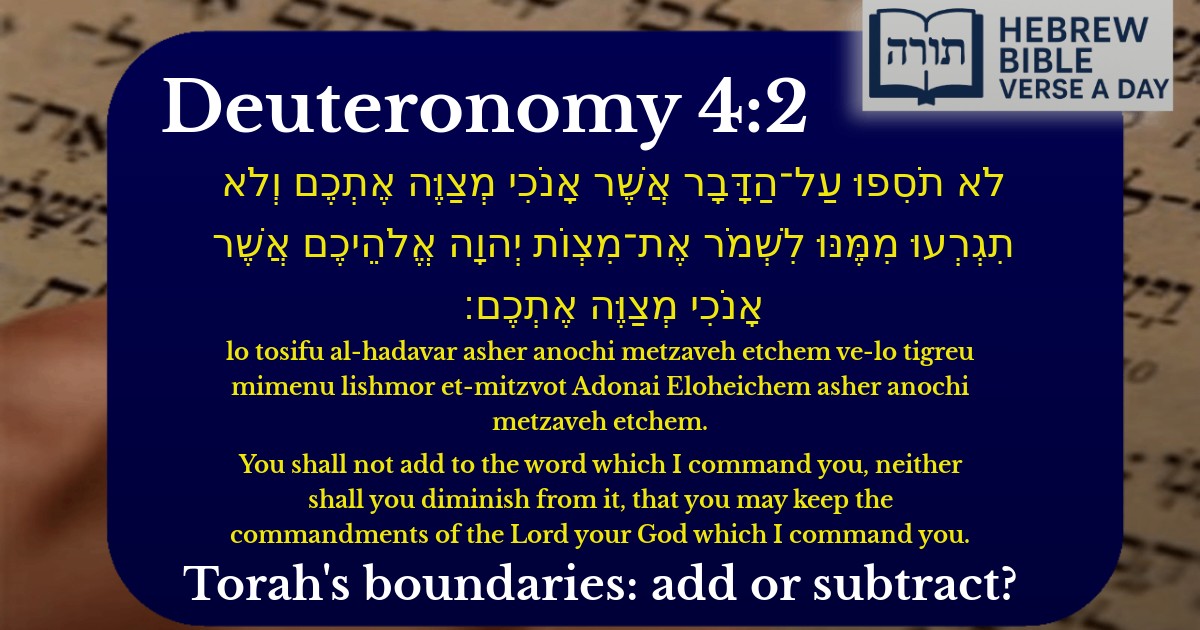Join Our Newsletter To Be Informed When New Videos Are Posted
Join the thousands of fellow Studends who rely on our videos to learn how to read the bible in Hebrew for free!
Hebrew Text
לֹא תֹסִפוּ עַל־הַדָּבָר אֲשֶׁר אָנֹכִי מְצַוֶּה אֶתְכֶם וְלֹא תִגְרְעוּ מִמֶּנּוּ לִשְׁמֹר אֶת־מִצְוֺת יְהוָה אֱלֹהֵיכֶם אֲשֶׁר אָנֹכִי מְצַוֶּה אֶתְכֶם׃
English Translation
You shall not add to the word which I command you, neither shall you diminish from it, that you may keep the commandments of the Lord your God which I command you.
Transliteration
Lo tosifu al-hadavar asher anochi metzaveh etchem ve-lo tigreu mimenu lishmor et-mitzvot Adonai Eloheichem asher anochi metzaveh etchem.
Hebrew Leining Text
לֹ֣א תֹסִ֗פוּ עַל־הַדָּבָר֙ אֲשֶׁ֤ר אָנֹכִי֙ מְצַוֶּ֣ה אֶתְכֶ֔ם וְלֹ֥א תִגְרְע֖וּ מִמֶּ֑נּוּ לִשְׁמֹ֗ר אֶת־מִצְוֺת֙ יְהֹוָ֣ה אֱלֹֽהֵיכֶ֔ם אֲשֶׁ֥ר אָנֹכִ֖י מְצַוֶּ֥ה אֶתְכֶֽם׃
Parasha Commentary
📚 Talmud Citations
This verse is quoted in the Talmud.
📖 Sanhedrin 29a
The verse is discussed in the context of adding or subtracting from the commandments, particularly in relation to the interpretation and application of the Torah's laws.
📖 Megillah 14a
The verse is referenced in a discussion about the authority of the prophets and the boundaries of their teachings in relation to the Torah.
📖 Nedarim 22b
The verse is cited in a discussion about the seriousness of making vows and the importance of adhering strictly to the commandments.


Prohibition Against Adding or Subtracting from the Torah
The verse (Devarim 4:2) prohibits adding to or subtracting from the commandments given by Hashem. This injunction is foundational to halachic observance, ensuring the integrity of Torah law as transmitted at Har Sinai.
Rashi's Explanation
Rashi explains that this prohibition includes:
These examples demonstrate that even enhancements with pious intent are forbidden when they alter the Torah's prescribed mitzvot.
Rambam's Halachic Perspective
In Mishneh Torah (Yesodei HaTorah 9:1), Rambam rules that this prohibition applies to both the Written and Oral Torah. One who adds or subtracts from mitzvot - whether in text, interpretation, or practice - violates this biblical commandment.
Talmudic Elaboration
The Sifrei (Devarim 4:2) explains that this prohibition includes:
The Boundaries of Rabbinic Legislation
The Talmud (Berachot 4b) discusses how this prohibition coexists with rabbinic enactments. While adding to Torah mitzvot is forbidden, Chazal had authority to establish:
These are permitted because they don't claim to be Torah commandments and are clearly distinguished as rabbinic in origin.
Spiritual Significance
The Kli Yakar explains that this prohibition teaches us that every mitzvah is perfectly balanced - adding or subtracting disrupts the divine wisdom embedded in each commandment. Just as a skilled artisan doesn't alter his masterpiece, we don't modify Hashem's perfect Torah.